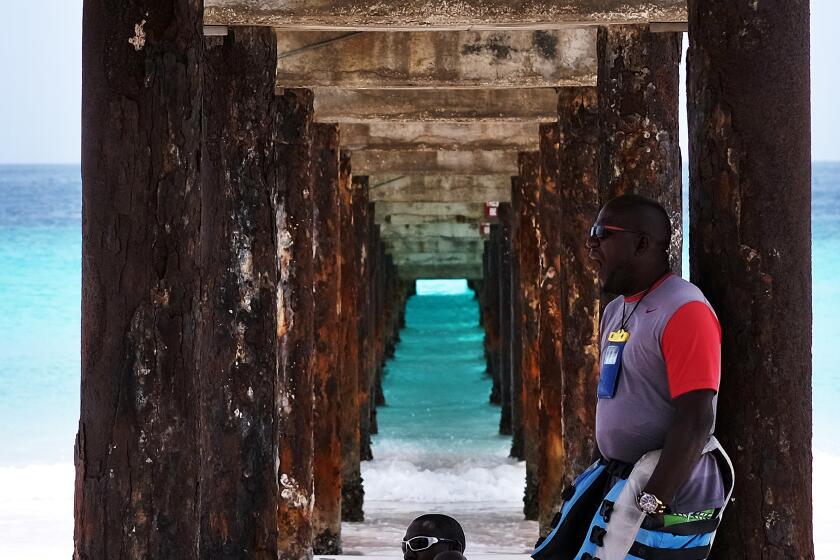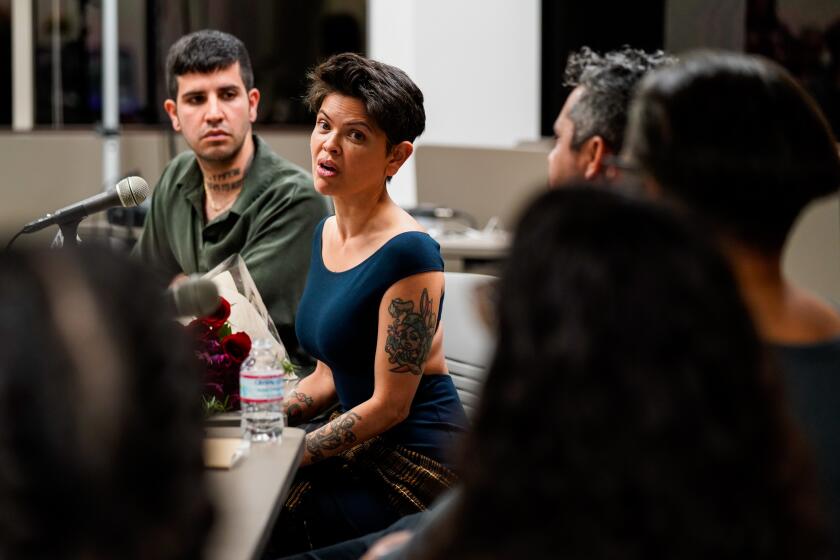Real housewives of diplomacy: A Namibia embassy novel turns an eye toward injustice
- Share via
On the Shelf
Embassy Wife
By Katie Crouch
FSG: 368 pages, $27
If you buy books linked on our site, The Times may earn a commission from Bookshop.org, whose fees support independent bookstores.
A shibboleth of book criticism: Never read the advance reviews of a book you’ve been assigned to write about. One doesn’t want to taint one’s purity of vision.
Or does one? As long as one has read the book and has a firm sense of one’s own thoughts, advance reviews can stiffen the spine. But sometimes one is just plain confused. “Embassy Wife,” the new novel from Katie Crouch, is described by the trade magazines as “a romp” and “a blast”; one wonders, did those reviewers read the same book?
Although Crouch’s novel is, yes, a sharp-eyed comic treatment of what the government refers to as “trailing spouses” — those who follow ambassadors to their sinecures — it’s also a sad-eyed testament to corruption and misogyny. Crouch has lived in Namibia and clearly seen how its citizens really live. But rather than write a story of pure suffering, she has taken the opportunity to contrast the country’s problems with the so-called struggles of its more pampered residents, government officials and diplomats.
First, the comic treatment. Persephone Wilder, career embassy wife, dresses all in white except when she exercises (then she wears “pure black”). She herds her children like trained circus animals. She spars with Mila Shilongo, wife of the Namibian minister of transportation and a “goddess” whose wardrobe includes “exactly the sort of high heels with red soles Melania Trump favored when visiting prisons for toddlers.” As these women prowl their turf, along comes Amanda Evans, who left a flourishing career in Silicon Valley to support her husband, Mark.
Cherie Jones’ debut novel, “How the One-Armed Sister Sweeps Her House,” focuses on the essential workers who make the tourist factory run.
Trouble is, Amanda isn’t sure what Mark’s career is. He spent a year in Namibia after college and is supposedly back on a Fulbright to study the country’s early 20th century genocide. Yet Mark doesn’t seem to participate in many research-based activities; she concludes he’s with the CIA.
Anxious and at loose ends, Amanda joins forces with Persephone to establish a rhino-protection nonprofit. All the tropes of mommy blogger fiction are in place: the white wine-fueled bitchfests, the slapdash school runs, the competitive bake sales. But Crouch is no mommy blogger. It’s fun to watch these real housewives of international diplomacy attempt to cope with a country they don’t understand. They are advised never to go to Katatura, where their cooks and housekeepers all live. It’s tempting to think the cooks and housekeepers are behind the warnings, securing for themselves some distance from the interloping foreigners.
An early flashback takes us back to the year Mark Evans spent in Namibia during college. Whiling away hours at a bar, he meets a gorgeous young woman peddling gemstones. On learning that Esther has never been to the beach, he coaxes her to ride the bus there. Her friend Amber agrees to persuade Esther, so long as he’ll join her: “With a white man, no one will touch us.” On the return trip, the combi bus is hit by a car; Mark is swiftly borne away to a Western-style hospital, Esther forgotten in the middle of the road. Finally waking after numerous surgeries, he is told she must have died, advised to forget about her.
Thus readers know early on that Mark has returned to Namibia in search of Esther — or at least her full name and her fate. Perhaps we should be relieved that he loved her, but it’s eros and not agape that carries Mark through the rest of the book — into a crazy gemstone-smuggling plot that belongs on the “romp” side of Crouch’s ledger.
Reading the flashback sections, I found it harder and harder to come back to Persephone’s schemes and Amanda’s petty concerns. Esther and her ilk aren’t just crammed into places like Katatura. The world of their Western counterparts is as close and yet utterly inaccessible as that simple day at the beach, trapped as they are in the cruel wedge of a Venn diagram encompassing poverty, misogyny and sexual violence.
‘How Beautiful We Were,’ the followup to Imbolo Mbue’s acclaimed debut, ‘Behold the Dreamers,’ features an African activist fighting a world of corruption.
The only thing worse, for Esther and Amber, than being forced to work jobs that pay far too little is losing those jobs and having nothing at all. And so when Esther aims higher, she becomes ensnared in the corruption that rules Namibia up to its highest levels.
One thinks it important, here, to note that Crouch — regardless of her time in Namibia, as the wife of a writer on a Fulbright — is a white woman writing about Africa in an #OwnVoices era. A frothy embassy tale just won’t cut it anymore, but if you don’t give readers something they’ll want to pick up, they may ignore everything else too. Not only does Crouch pull off this subtle concoction of sugar and medicine, she deftly blends them by involving Mark in a gemstone racket that reeks of exploitative colonialism, ancient and modern.
The denouément of “Embassy Wife” involves bush camping, rhinos and one-upmanship, among many other things, serving to explain not just what the characters have been up to but what happens when a country turns a blind eye to its people.
Come for the romp but stay for the study of human nature and human survival. When you’re out in the wild, Crouch suggests, it’s hunt or be hunted — or find a source of protection. Sometimes that comes in a persona, sometimes a spouse, sometimes in knowing when it’s time to abscond. For a writer setting her sights set on a summer readership, it might mean coating a very bitter pill with some sweet folly. In “Embassy Wife,” Crouch makes tough lessons very easy to swallow.
Inside a packed room in Culver City on Thursday, Myriam Gurba, Roxane Gay and other writers of color talked about “American Dirt,” Macmillan and the “crisis” in U.S. publishing.
Patrick is a freelance critic who tweets @TheBookMaven.
More to Read
Sign up for our Book Club newsletter
Get the latest news, events and more from the Los Angeles Times Book Club, and help us get L.A. reading and talking.
You may occasionally receive promotional content from the Los Angeles Times.












